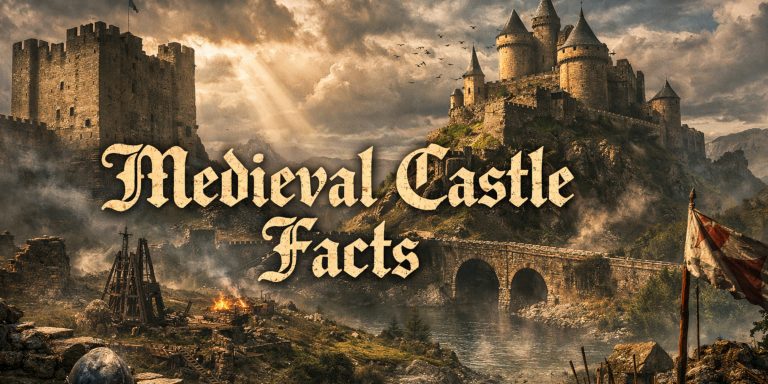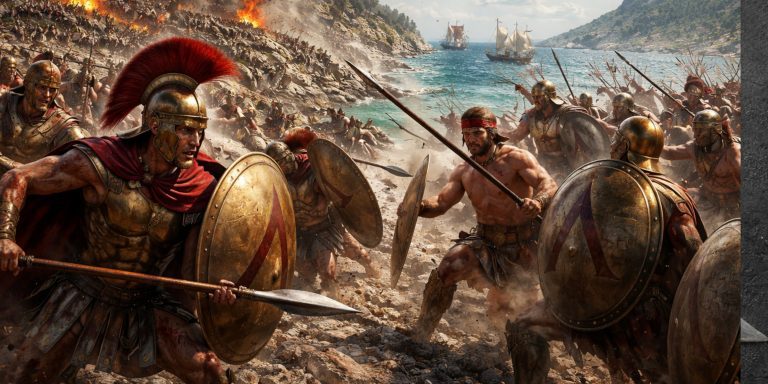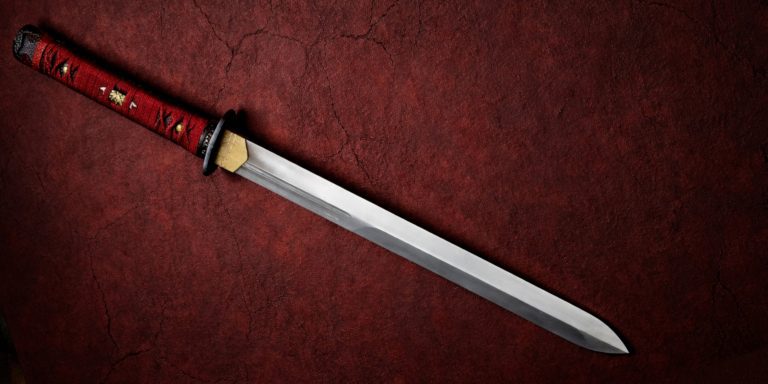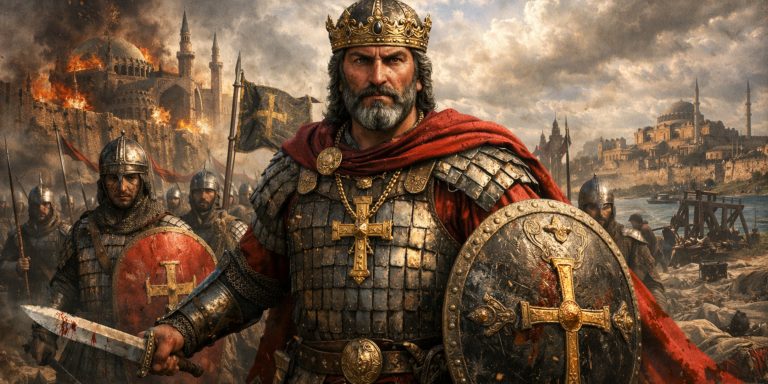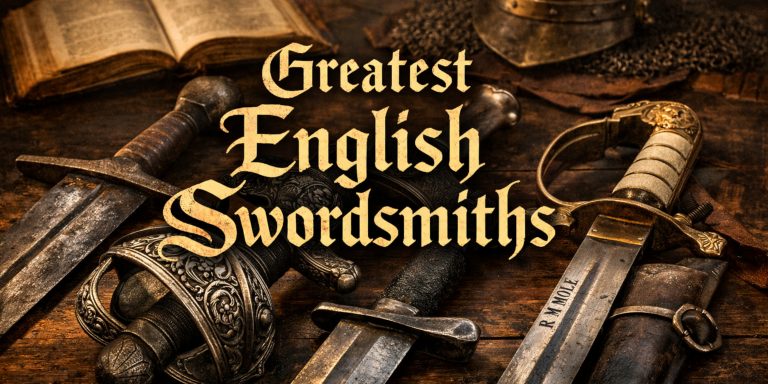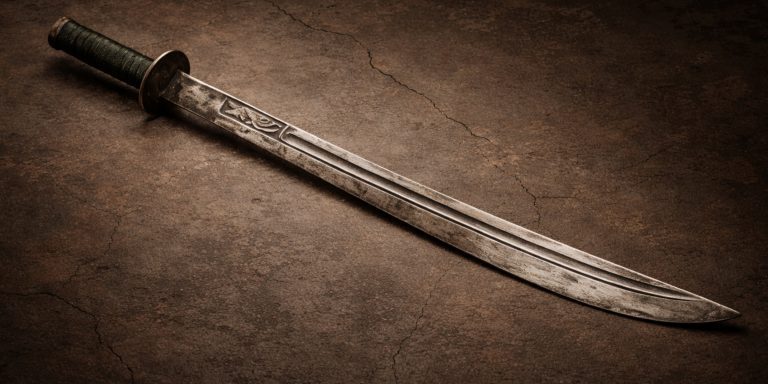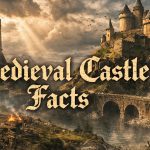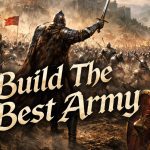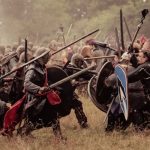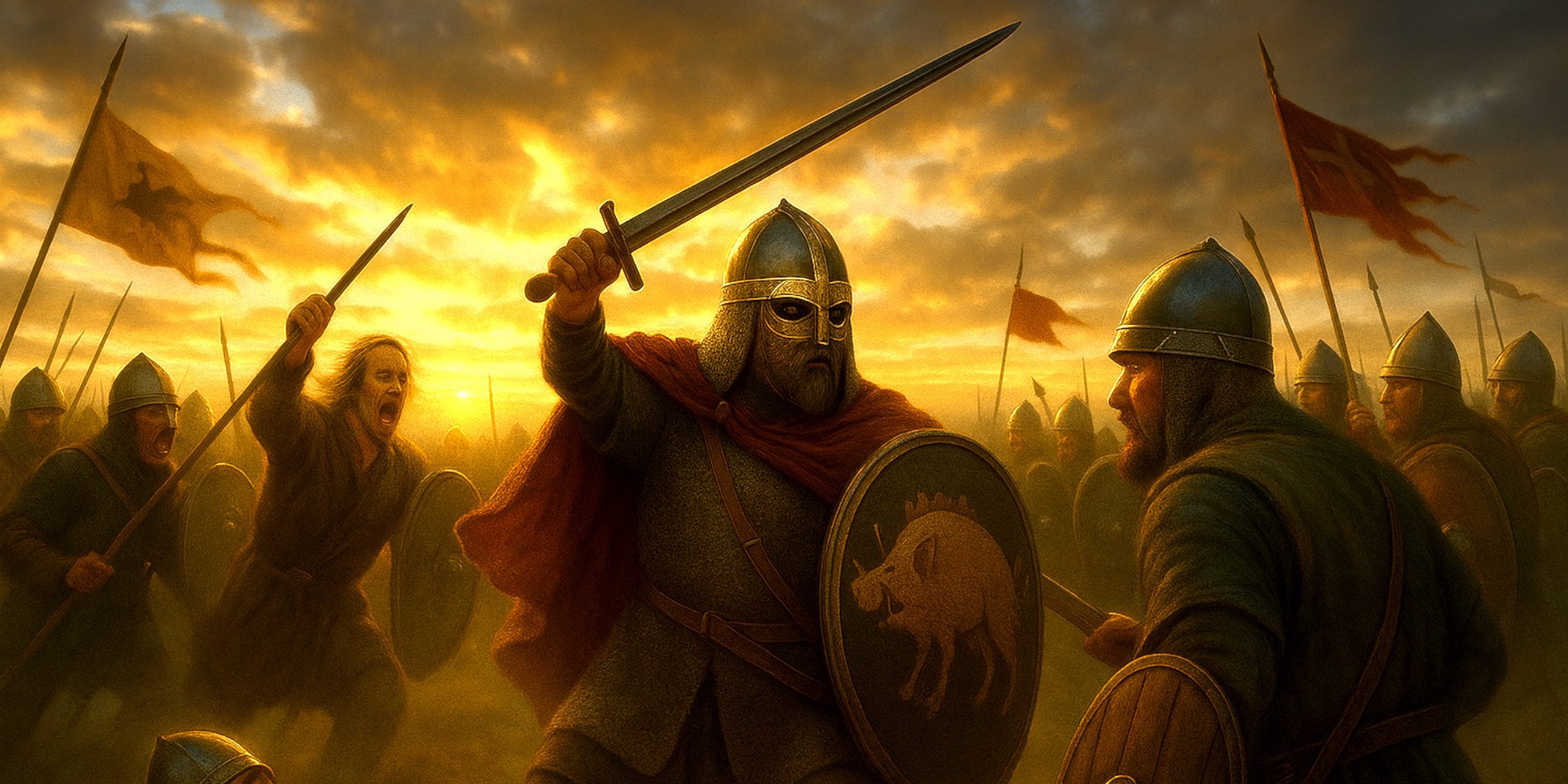
The Anglo-Saxon centuries were shaped by ambition, belief, and a quite unnecessary number of axes.
From the early migrations to the Norman invasion, England’s identity was hammered out through victory and defeat.
Some of these battles are legendary, some painfully real, and all of them mattered.
What follows is a journey from the uncertain dawn of the Saxon age to its final sunset in 1066.
25. Battle of Mount Badon (c. 490)
Commanders: Britons (possibly under Ambrosius or Arthur) vs early Saxon settlers
Troop Estimates: Around 10,000
Weapons: Spears, shields, early swords
Outcome: Briton victory
Legacy: Temporarily halted Saxon expansion. A rare moment when the island’s native Britons pushed back the tide, giving later historians a field day with speculation and legend.
24. Battle of Aylesford (455)
Commanders: Hengest and Horsa vs Vortigern’s Britons
Troop Estimates: Around 6,000
Weapons: Spears, seaxes, pattern-welded swords
Outcome: Saxon victory (though Horsa was slain)
Legacy: The semi-mythical start of Anglo-Saxon settlement. Whether it happened exactly as told is debatable, but it marks the symbolic birth of a new order in Britain.
23. Battle of Dyrham (577)
Commanders: Ceawlin of Wessex vs Britons of Gloucester, Cirencester, and Bath
Troop Estimates: Around 5,000
Weapons: Spears, short swords, seaxes
Outcome: Saxon victory
Legacy: Split Wales from the south-west Britons and opened the road to Bath. Geography and politics were redrawn in blood.
22. Battle of Peonnum (658)
Commanders: King Cenwalh of Wessex vs Britons of Dumnonia
Troop Estimates: Around 6,000
Weapons: Spears, seaxes, swords, oval shields
Outcome: Wessex victory
Legacy: Pushed the Britons into Cornwall and defined England’s western frontier for centuries.
21. Battle of Chester (616)
Commanders: Æthelfrith of Northumbria vs Welsh coalition
Troop Estimates: Around 10,000
Weapons: Spears, seaxes, swords
Outcome: Northumbrian victory
Legacy: Divided the Welsh kingdoms. The slaughter of monks on the field hinted that Christianity had not yet tamed its followers.
20. Battle of Degsastan (603)
Commanders: Æthelfrith of Northumbria vs Áedán mac Gabráin of Dál Riata
Troop Estimates: Around 10,000
Weapons: Spears, swords, oval shields
Outcome: Northumbrian victory
Legacy: Established Northumbria as the north’s dominant power. The Scots would think twice before venturing south again.
19. Battle of Heavenfield (634)
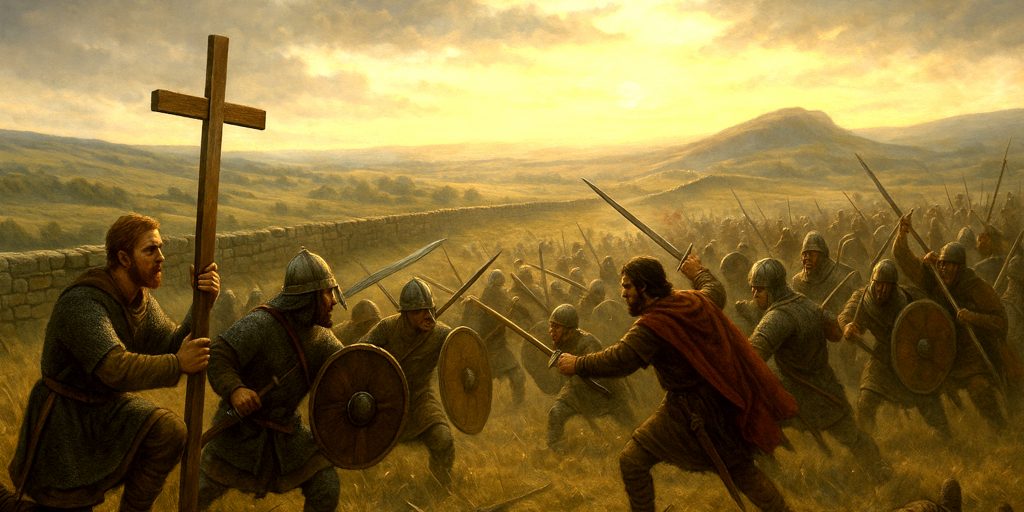
Commanders: King Oswald of Northumbria vs Cadwallon ap Cadfan of Gwynedd
Troop Estimates: Around 7,000
Weapons: Spears, swords, early pattern-welded blades
Outcome: Northumbrian victory
Legacy: Christianity returned to Northumbria, along with Oswald’s reputation as a saintly warrior.
18. Battle of Hatfield Chase (633)
Commanders: King Edwin of Northumbria vs Cadwallon ap Cadfan and Penda of Mercia
Troop Estimates: Around 12,000
Weapons: Spears, seaxes, swords
Outcome: Welsh-Mercian victory
Legacy: Ended Edwin’s reign and plunged the north into chaos. Paganism briefly resurfaced amid the wreckage.
17. Battle of Maserfield (642)
Commanders: King Oswald of Northumbria vs King Penda of Mercia
Troop Estimates: Around 10,000
Weapons: Spears, swords, seaxes
Outcome: Mercian victory
Legacy: Penda’s triumph turned Oswald into a martyr. Mercia’s power rose, Northumbria’s halo slipped.
16. Battle of Winwaed (655)
Commanders: King Oswiu of Northumbria vs King Penda of Mercia
Troop Estimates: Around 10,000
Weapons: Spears, swords, seaxes, shields
Outcome: Northumbrian victory
Legacy: Penda’s death ended the last great pagan challenge in England. Christianity took firm control of English kingship.
15. Battle of Ellandun (825)
Commanders: King Egbert of Wessex vs King Beornwulf of Mercia
Troop Estimates: Around 8,000
Weapons: Spears, swords, round shields
Outcome: Wessex victory
Legacy: The battle that made Wessex pre-eminent. Egbert’s success marked the start of England’s unification under the southern crown.
14. Battle of Hingston Down (838)
Commanders: King Egbert of Wessex vs Danes and Cornish Britons
Troop Estimates: Around 9,000
Weapons: Spears, swords, axes, mail shirts
Outcome: Wessex victory
Legacy: Secured Cornwall’s submission. The southwest finally fell into line, albeit resentfully.
13. Battle of Reading (871)
Commanders: King Æthelred I and Alfred vs the Great Heathen Army
Troop Estimates: Around 8,000
Weapons: Spears, axes, shields
Outcome: Danish victory
Legacy: A sobering defeat for Wessex. The Danes’ discipline and ferocity taught Alfred the importance of reforming his armies.
12. Battle of Ashdown (871)
Commanders: King Æthelred I and Alfred vs Halfdan Ragnarsson and Bagsecg
Troop Estimates: Around 9,000
Weapons: Spears, swords, seaxes, shields
Outcome: Saxon victory
Legacy: Alfred’s first real triumph. He fought while Æthelred was still praying, proving the gods might favour punctuality after all.
11. Battle of Meretun (871)
Commanders: King Æthelred I and Alfred vs Danish army
Troop Estimates: Around 8,000
Weapons: Spears, axes, seaxes
Outcome: Indecisive
Legacy: Brutal and costly, showing how close Wessex came to ruin before Alfred’s resurgence.
10. Battle of Wilton (871)
Commanders: King Alfred vs Danish army
Troop Estimates: Around 7,000
Weapons: Spears, swords, seaxes
Outcome: Danish victory
Legacy: Alfred’s final defeat before his redemption at Edington. He learned patience, strategy, and the value of fortified towns.
9. Battle of Cynwit (878)
Commanders: Odda of Devon vs Ubba Ragnarsson
Troop Estimates: 2,000 Saxons vs 1,200 Vikings
Weapons: Spears, axes, swords
Outcome: Saxon victory
Legacy: Ubba’s death and the capture of the Raven Banner signalled that Wessex was not finished yet.
8. Battle of Edington (878)
Commanders: King Alfred of Wessex vs Guthrum the Dane
Troop Estimates: About 8,000 combined
Weapons: Spears, seaxes, swords, axes, round shields
Outcome: Saxon victory
Legacy: Alfred’s crowning achievement. Guthrum’s defeat led to the Treaty of Wedmore and the birth of a more cohesive English realm.
7. Battle of Tettenhall (910)

Commanders: Edward the Elder and Æthelflæd of Mercia vs Northumbrian Danes
Troop Estimates: Around 10,000
Weapons: Spears, swords, Danish axes
Outcome: English victory
Legacy: Broke Viking power in central England. Æthelflæd earned lasting respect, proving that competence sometimes runs in royal families.
6. Battle of Maldon (991)
Commanders: Ealdorman Byrhtnoth vs Olaf Tryggvason
Troop Estimates: Around 4,000
Weapons: Spears, axes, seaxes, round shields
Outcome: Viking victory
Legacy: Immortalised in poetry. Byrhtnoth’s fatal pride became an enduring cautionary tale: never let your opponent cross the causeway first.
5. Battle of Brunanburh (937)
Commanders: King Aethelstan vs Olaf Guthfrithson, Constantine II, and Owain of Strathclyde
Troop Estimates: Around 15,000 combined
Weapons: Spears, swords, mail shirts, great shields
Outcome: English victory
Legacy: The defining triumph of a united English kingdom. Chroniclers glorified it for centuries, and with some justification.
4. Battle of Assandun (1016)
Commanders: King Edmund Ironside vs Cnut the Great
Troop Estimates: Around 15,000
Weapons: Spears, axes, swords, early kite shields
Outcome: Danish victory
Legacy: Cnut’s conquest turned England into a North Sea empire. Edmund’s courage in defeat earned even his enemy’s respect.
3. Battle of Sherston (1016)
Commanders: King Edmund Ironside vs Cnut the Great
Troop Estimates: Around 14,000
Weapons: Spears, axes, seaxes
Outcome: Indecisive
Legacy: A punishing struggle that demonstrated how equally matched the two claimants were. England’s crown hung by a thread.
2. Battle of Stamford Bridge (1066)
Commanders: King Harold Godwinson vs Harald Hardrada and Tostig Godwinson
Troop Estimates: 12,000–15,000 combined
Weapons: Danish axes, swords, kite shields, mail hauberks
Outcome: English victory
Legacy: Harold’s great victory was immediately overshadowed. His exhausted army had barely rested when news arrived of William’s landing in the south.
1. Battle of Hastings (1066)
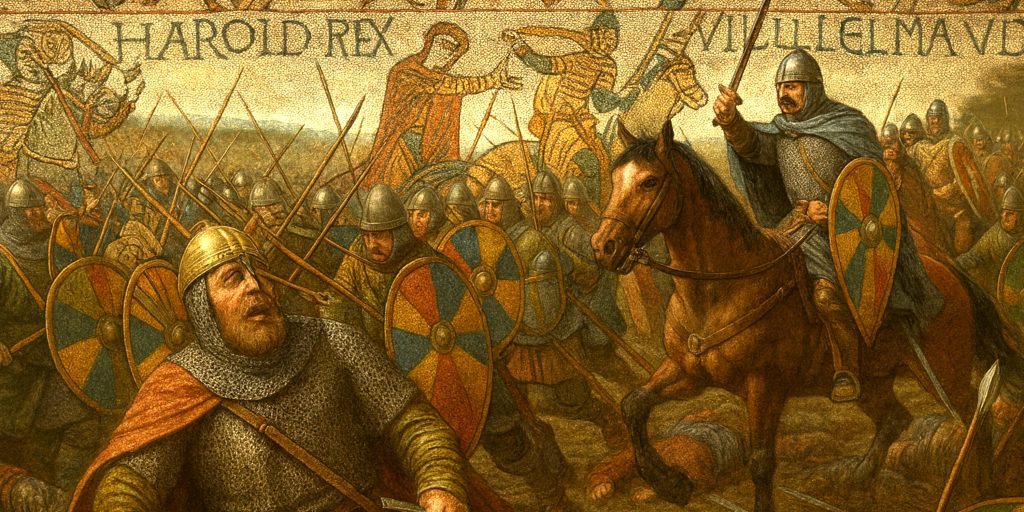
Commanders: King Harold Godwinson vs Duke William of Normandy
Troop Estimates: Around 15,000 combined
Weapons: Spears, swords, kite shields, longbows, Norman lances
Outcome: Norman victory
Legacy: The end of Anglo-Saxon England. William’s triumph brought Norman feudalism, castle-building, and a permanent shift in England’s elite.
No other battle so completely rewrote the nation’s destiny.
The Seven Swords Takeaway
From the uncertain twilight of Roman Britain to the brutal clarity of Norman conquest, these twenty-five battles tell the story of England’s making.
Faith, identity, and the crown itself were hammered into shape on these fields.
The Anglo-Saxons may have lost their last war, but they left behind a kingdom, and a culture, that never truly disappeared.

